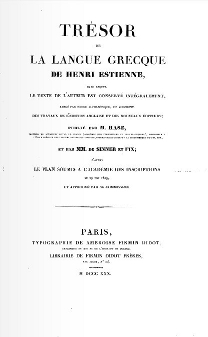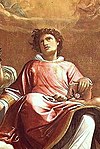
Year 1530 (MDXXX) was a common year starting on Saturday of the Julian calendar, the 1530th year of the Common Era (CE) and Anno Domini (AD) designations, the 530th year of the 2nd millennium, the 30th year of the 16th century, and the 1st year of the 1530s decade.

Robert I Estienne, known as Robertus Stephanus in Latin and sometimes referred to as Robert Stephens, was a 16th-century printer in Paris. He was the proprietor of the Estienne print shop after the death of his father Henri Estienne, the founder of the Estienne printing firm. Estienne published and republished many classical texts as well as Greek and Latin translations of the Bible. Known as "Printer to the King" in Latin, Hebrew, and Greek, Estienne's most prominent work was the Thesaurus linguae latinae which is considered to be the foundation of modern Latin lexicography. Additionally, he was the first to print the New Testament divided into standard numbered verses.

Henri Estienne, also known as Henricus Stephanus, was a French printer and classical scholar. He was the eldest son of Robert Estienne. He was instructed in Latin, Greek, and Hebrew by his father and would eventually take over the Estienne printing firm which his father owned in 1559 when his father died. His most well-known work was the Thesaurus graecae linguae, which was printed in five volumes. The basis of Greek lexicology, no thesaurus would rival that of Estienne's for three hundred years.

Caen is a commune 15 km (9.3 mi) inland from the northwestern coast of France. It is the prefecture of the department of Calvados. The city proper has 105,512 inhabitants, while its functional urban area has 470,000, making Caen the second largest urban area in Normandy and the 19th largest in France. It is also the third largest commune in all of Normandy after Le Havre and Rouen.

Étienne or Estienne de La Boétie was a French magistrate, classicist, writer, poet and political theorist, best remembered for his intense and intimate friendship with essayist Michel de Montaigne. His early political treatise Discourse on Voluntary Servitude was posthumously adopted by the Huguenot movement and is sometimes seen as an early influence on modern anti-statist, utopian and civil disobedience thought.

Charles Estienne, known as Carolus Stephanus in Latin and Charles Stephens in English, was an early exponent of the science of anatomy in France. Charles was a younger brother of Robert Estienne I, the famous printer, and son to Henri, who Latinized the family name as Stephanus. He married Geneviève de Berly.
Henri is the French form of the masculine given name Henry, also in Estonian, Finnish, German and Luxembourgish.
French Renaissance literature is, for the purpose of this article, literature written in French from the French invasion of Italy in 1494 to 1600, or roughly the period from the reign of Charles VIII of France to the ascension of Henry IV of France to the throne. The reigns of Francis I and his son Henry II are generally considered the apex of the French Renaissance. After Henry II's unfortunate death in a joust, the country was ruled by his widow Catherine de' Medici and her sons Francis II, Charles IX and Henry III, and although the Renaissance continued to flourish, the French Wars of Religion between Huguenots and Catholics ravaged the country.
Étienne, a French analog of Stephen or Steven, is a masculine given name. An archaic variant of the name, prevalent up to the mid-17th century, is Estienne.
Stephanus is a masculine given name, a surname and a genus. It may refer to:
Philibert may refer to the following people:
Henri Estienne also known as Henricus Stephanus, was a 16th-century Parisian printer. Born in Paris in 1460 or 1470, he is the son of Geoffroy d'Estienne and Laure de Montolivet. His brother Raimond d'Estienne became the heir of the Estienne family, while Henri was disinherited by his father in 1482 "for having devoted himself to printing", the profession of printer then being the cause of losing your title. Estienne established the Estienne printing firm in 1502 from his wife's deceased husband's Higman Press. After his death in 1520, his wife married his colleague Simon de Colines who took control of the Estienne Press until his son Robert Estienne assumed control of the press in 1526.
Franciscus is a Latin given name, originally an epithet meaning "the Frank, the Frenchman". It was applied to Saint Francis of Assisi (1181/82–1226). Francis had been baptized Giovanni (John); his father was Italian and his mother Provençale ; his father was on business in France when he was born, and when he returned to Assisi, he began to call his son by the nickname Francesco, in the opinion of G. K. Chesterton possibly because out of a general enthusiasm for all things French, or because of his commercial success in France. After the canonization of Saint Francis of Assisi in 1228, the custom of naming children after saints led to the popularization of Franciscus as a given name. In the vernaculars of western Europe, the name diversified into the forms Francesco (Italian), Francisco, Francesc (Catalan), François, Franz ; besides Frans, the Latin form remains commonly given in Dutch.

Estienne Roger was a francophone printer, bookseller and publisher of sheet music working in the Netherlands.

Simon de Colines was a Parisian printer and one of the first printers of the French Renaissance. He was active in Paris as a printer and worked exclusively for the University of Paris from 1520 to 1546. In addition to his work as a printer, Colines worked as an editor, publisher, and punchcutter. Over the course of his lifetime, he published over 700 separate editions. Colines used elegant roman and italic types and a Greek type, with accents, that were superior to their predecessors. These are now called French old-style, a style that remained popular for over 200 years and revived in the early 20th century. He used rabbits, satyrs, and philosophers as his pressmark.
Dumont is a French surname, which may refer to:

The Parliament of Aix-en-Provence was the provincial parlement of Provence from 1501 to 1790. It was headquartered in Aix-en-Provence, which served as the de facto capital of Provence.
Denis Janot was a printer and bookseller from Paris, France, whose store was near Notre Dame de Paris. Janot, who was born into a family of printers and booksellers and married into another such one, was notable for printing books in the vernacular, especially in the field of the humanities, and for commissioning illustrations for the books he printed. He is responsible for printing many of the notable classical authors as well as for contemporary ones, particularly in the matter of the Querelle des femmes, the contemporary discussion over the status of women.
Henricus is a given name. People with the name include:








